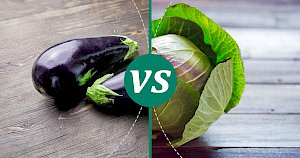Cabbage vs Eggplant: Nutrition, Calories & Protein Compared


Cabbage vs Eggplant
Nutrition Facts
Serving size:
change
5g10g15g20g30g40g50g60g80g100g120g140g160g180g200g220g250g300g350g400g450g500g600g700g800g900g1000g
1oz2oz3oz4oz5oz6oz7oz8oz10oz12oz15oz20oz25oz30oz35oz40oz50oz
Amount Per Serving:
Serving size:
change
5g10g15g20g30g40g50g60g80g100g120g140g160g180g200g220g250g300g350g400g450g500g600g700g800g900g1000g
1oz2oz3oz4oz5oz6oz7oz8oz10oz12oz15oz20oz25oz30oz35oz40oz50oz
Amount Per Serving:
Cabbage vs Eggplant 100g Compare
| per 100g | Cabbage | Eggplant |
|---|---|---|
| Calories | 25 | 24 |
| Carbohydrates | 5.8 g | 5.7 g |
| Fat | 0.1 g | 0.19 g |
| Dietary fiber | 2.5 g | 3.4 g |
| Protein | 1.3 g | 1 g |
| Calcium | 40 mg | 9 mg |
| Iron | 0.47 mg | 0.24 mg |
| Magnessium | 12 mg | 14 mg |
| Potassium | 170 mg | 230 mg |
| Sodium | 18 mg | 2 mg |
| Zink | 0.18 mg | 0.16 mg |
| Vitaminium A | 98 µg | 27 µg |
| Vitaminium B1 (Thiamine) | 0.061 mg | 0.039 mg |
| Vitaminium B2 (riboflavin) | 0.04 mg | 0.037 mg |
| Vitaminium B3 (Niacin) | 0.234 mg | 0.649 mg |
| Vitaminium B5 | 0.212 mg | 0.281 mg |
| Vitaminium B6 | 0.124 mg | 0.084 mg |
| Vitaminium B9 (Folic acid) | 53 mg | 22 mg |
| Vitaminium C | 36.6 mg | 2.2 mg |
| Vitaminium K | 76 µg | 3.5 µg |
Delving into the World of Cabbage and Eggplant
When it comes to vegetables, cabbage and eggplant are two staples in kitchens around the globe. Each offers a unique flavor profile and versatility in cooking, making them favorites among chefs and home cooks alike. But beyond their culinary uses, these vegetables are also packed with nutrients, offering a range of health benefits. Whether you're counting calories, monitoring your nutrient intake, or simply curious about how these vegetables stack up against each other, this comparison will shed light on the nutritional aspects of cabbage versus eggplant.
Nutritional Face-off: Cabbage vs Eggplant
At first glance, cabbage and eggplant have similar calorie counts, with cabbage containing approximately 25 calories per 100 grams and eggplant slightly less at 24 calories. This makes both vegetables excellent choices for those managing their weight or seeking low-calorie options for their meals.
- Carbohydrates: Both vegetables are low in carbs, with cabbage at 5.8g and eggplant at 5.7g per 100 grams, making them suitable for low-carb diets.
- Fiber: Eggplant takes the lead in fiber content with 3.4g, compared to cabbage's 2.5g, aiding in digestion and satiety.
- Fat: Both are very low in fat, with eggplant containing a slightly higher amount (0.19g) than cabbage (0.1g).
- Protein: Cabbage contains a bit more protein (1.3g) than eggplant (1g), though both are not high-protein foods.
When it comes to vitamins and minerals, both vegetables offer valuable contributions to your daily nutritional needs, though there are some notable differences:
- Vitamin C: Cabbage is an excellent source of Vitamin C, with 36.6mg per 100g, significantly higher than eggplant's 2.2mg.
- Vitamin K: Cabbage also provides a more substantial amount of Vitamin K (76µg) compared to eggplant (3.5µg).
- Calcium and Potassium: Cabbage contains more calcium (40mg), while eggplant boasts a higher potassium content (230mg).
What Does This Mean for Your Diet?
Choosing between cabbage and eggplant depends on your dietary needs and health goals. If you're looking for a vegetable that supports bone health and blood clotting, cabbage with its higher Vitamin K and calcium content might be the way to go. On the other hand, if you're seeking to improve digestion or meet your potassium needs for heart health, eggplant's higher fiber and potassium levels make it a suitable choice.
Ultimately, both cabbage and eggplant are nutritious vegetables that can play a beneficial role in a balanced diet. Their low calorie and carb content, along with a host of vitamins and minerals, make them versatile additions to various dishes. Whether you're whipping up a stir-fry, a stew, or a grilled vegetable platter, incorporating these vegetables can enhance your meals both nutritionally and flavor-wise.
In conclusion, while cabbage and eggplant have their unique nutritional profiles, they both offer significant health benefits. By understanding the nutritional differences and similarities between these two vegetables, you can make informed choices that support your health and wellness goals. Remember, a diverse diet rich in a variety of vegetables is key to getting the nutrients your body needs.
Cabbage 100g
25kcalCalories source
- 79% CARBS.
- 18% PROTEIN
- 3% FAT
Eggplant 100g
24kcalCalories source
- 80% CARBS
- 14% PROTEIN
- 6% FAT
Compares of cabbage
- Cabbage vs Artichoke
- Cabbage vs Arugula
- Cabbage vs Asparagus
- Cabbage vs Bamboo Shoots
- Cabbage vs Beetroot
- Cabbage vs Bok Choy
- see all compares of cabbage
Marcin Piotrowicz
calories-info.com creator
Healthy diet and healthy lifestyle promoter
Add comment